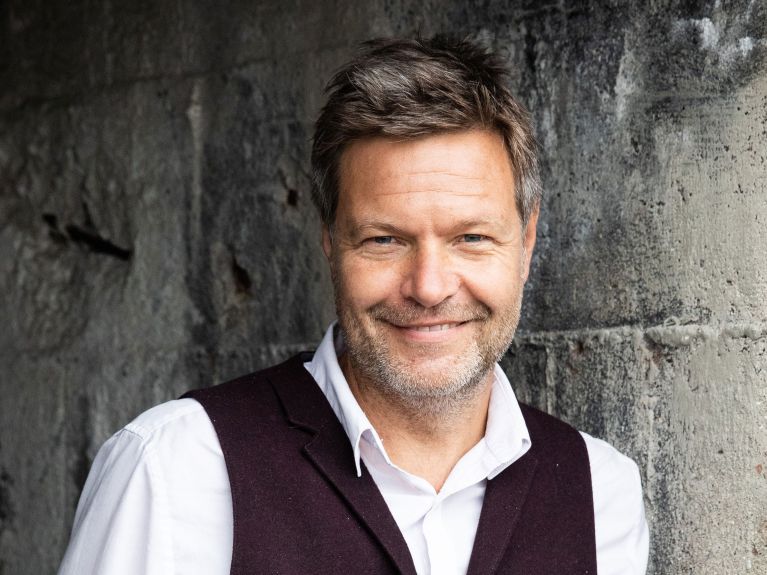“The transformation has begun”
Reconciling prosperity and climate action is the goal of the German government. Robert Habeck, Federal Minister for Economic Affairs and Climate Action, discusses in an interview what this will mean for the population.

Minister Habeck, the new Federal Ministry for Economic Affairs and Climate Action aims to reconcile economy and ecology. How are you addressing this task?
Climate action and a successful, competitive economy are not opposites. Germany can and should set a good example here. Our economy has the innovative force to develop climate-friendly processes and products. We want to continue creating the foundations and the necessary incentives for this. Sustainable management must be anchored in all policy areas in a more binding and more consistent way, and businesses and households must be supported in making the necessary adjustments and investments for the future. In the Annual Economic Report we have outlined initial concrete steps towards a social-ecological market economy.
Climate action costs money and the economy is meant to make money. Can the two go together in an industrial nation like Germany?
Undeniably, climate action costs money in the first instance. That’s why we’re also prepared to support the necessary investments with additional incentives. The transformation presents enormous opportunities not only for industry, but also for the skilled trades and the SME sector. These investments will generate orders across the whole economy and give rise to new, innovative business areas offering new opportunities for German industry, also when competing on international markets.
What opportunities will the restructuring of the economy offer in terms of international competitiveness?
The restructuring of the economy to achieve climate neutrality offers major opportunities for German industry. The transformation has already begun: we know that markets will change and that industrial processes will have to be adjusted. The demand for sustainable products will continue to rise; climate action will increasingly become an economic factor. We now have the chance to be one of the leaders at the forefront of a transformation that is already taking place. Modern, efficient and resource-saving technologies are drivers of growth and innovation. German companies have the experience, the expertise and the means to develop sustainable solutions. We will provide the best possible support to enable them to take these opportunities – with the aid not only of appropriate economic framework conditions and public investments, but also targeted funding.
Work will also change with the economy: what will people in traditional blue-collar occupations do in future – for example, the excavator driver in the coalmine or the exhaust fitter in the car factory?
New business models and technologies can create not only climate-neutral prosperity, but also decent jobs. The underlying structural transformation will certainly lead to certain occupations dying out. At the same time, however, totally new occupations are arising and they will also often be followed by a corresponding demand for skilled personnel. Paradoxically, depending on the respective region and sector, we’ll be able to simultaneously observe surpluses and shortages of skilled labour; in fact, that is in part already the case today. The great challenge will be in retraining the people that previously did jobs that will no longer be needed in the future as promptly as possible so they can assume new duties elsewhere. Further training and skills development thus play a very central role here.
Bearing in mind demographic change, will the retrainees from declining industries be enough to meet labour market demand?
Prognoses normally always entail a certain amount of uncertainty, and this uncertainty increases the further into the future you look. In the case of demographic change, however, the forecasts are in fact relatively reliable: we know how many people were born in a particular year and based on this we can make very good assumptions on how many people will be active in the labour market several decades ahead. Using these studies as a basis, we in the Federal Government assume that Germany will require more immigration of labour. That’s why we have resolved to improve immigration law.
From blue collar to white collar – the coronavirus has accelerated many developments in how we work, including working from home and
online meetings. What does this new world of work mean for climate action?
It’s not possible to carry out every kind of work at home. And that will also certainly remain the case in future. Nevertheless, the pandemic has shown how much is actually already possible today in this area, when necessary. If people increasingly work from home, that has various consequences. Among other things, we saw fewer rush-hour traffic jams and fewer business trips being undertaken. And if that results in fewer people driving to work every day by car or a decrease in the number of business flights, for example, then of course that can also contribute to climate action.
What significance do new ways of working have for the German economy? Are they just a buzzword or are they becoming a reality?
Companies are doing everything they can to become the most attractive possible employers when competing for the best brains. This naturally also involves offering employees flexible working models. There are already large numbers of skilled employees today that face a labour market situation in which they can freely choose between various job offers. Some of these specialists will not only decide on who to work for on the basis of the respective pay offer, but take into account additional criteria – for example, aspects such as climate action and sustainability. To that extent, businesses that take climate action seriously will also be able to score points on the labour market when competing with other employers.
In conclusion, let’s take a look into the crystal ball – where do you see the German economy in the year 2030?
It’s very clear to me that the position of the German economy in 2030 will depend very decisively on how we use and shape the coming months and years. Climate action is a challenge that can allow us to grow, and I sense a broad readiness to finally get to grips with this now. At the same time we must also not lose sight of the enormous challenges that arise from demographic change and that will clearly manifest themselves on the labour market by the middle of the decade at the latest. If we do nothing, demographic trends will increasingly stifle our growth potentials. To address this we will have to provide good answers in terms of a social-ecological market economy. The plans agreed by the “traffic-light coalition” point in the right direction.
You would like to receive regular information about Germany? Subscribe here:


